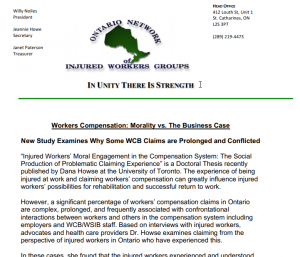From Injured Workers Online:
Workers’ compensation: morality versus the business case
The experience of being injured at work and claiming workers’ compensation can greatly influence injured workers’ possibilities for rehabilitation and successful return to work. A new study examines why some claims are prolonged, conflicted and frequently associated with confrontational interactions between Ontario workers and others in the compensation system including employers and workplace Safety and Insurance Board (WCB/WSIB) staff. A doctoral thesis by Dana Howse – Injured Workers’ Moral Engagement in the Compensation System: The Social Production of Problematic Claiming Experience (University of Toronto, Nov. 2017) – examines claiming from the perspective of injured workers in Ontario who have experienced difficult claims.
 Her study points to radically different views of our workers’ compensation system. Based on interviews with injured workers, advocates and health care providers, she found that these injured workers experienced and understood the workers’ compensation system in moral terms: they see workers’ compensation as part of our justice system and evaluate experiences in terms of what is just and unjust, fair and unfair. However, the WSIB’s texts and practices reflected a neo-liberal view of the system where the goals are administrative and financial cost efficiency and policies and procedures are created or changed to achieve them. To move forward and improve circumstances for injured workers with difficult claims, Dr. Howse suggests the WSIB reconsider its practices and the way its understanding of workers’ compensation is seen by injured workers… [read ONIWG commentary and Plain language summary and full thesis]
Her study points to radically different views of our workers’ compensation system. Based on interviews with injured workers, advocates and health care providers, she found that these injured workers experienced and understood the workers’ compensation system in moral terms: they see workers’ compensation as part of our justice system and evaluate experiences in terms of what is just and unjust, fair and unfair. However, the WSIB’s texts and practices reflected a neo-liberal view of the system where the goals are administrative and financial cost efficiency and policies and procedures are created or changed to achieve them. To move forward and improve circumstances for injured workers with difficult claims, Dr. Howse suggests the WSIB reconsider its practices and the way its understanding of workers’ compensation is seen by injured workers… [read ONIWG commentary and Plain language summary and full thesis]
- Presentation Dec. 7, 10 a.m. EST: Dr Howse will be discussing her study Friday December 7th – sign in to the live stream at ONIWG’s Facebook
(If you don’t see the streaming video when you arrive at the page, wait a few minutes and try refreshing the page)